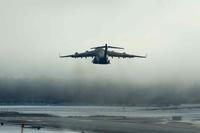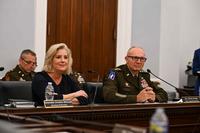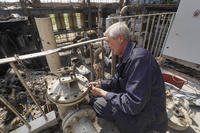Editor's note: This story and its headline have been corrected. A previous version of this story, "Dunford Refuses to Pull Back US Observation Posts in Syria," inadvertently used language from a readout of a Dec. 13 phone call between Dunford and Gen. Yasar Guler, in which Dunford said the U.S. would continue to use forward observation posts in Syria. The topic of observation posts did not come up in meetings Jan. 7-8, officials said.
Joint Chiefs Chairman Gen. Joseph Dunford met in Ankara Monday and Tuesday with his Turkish counterpart, Gen. Yasar Guler, and Defense Minister Hulusi Akar on the planned U.S. ground troop withdrawal from Syria, according to a readout of the meeting from the Joint Chiefs of Staff.
The talks focused on "the security situation in Syria," the readout said, and "the deliberate, coordinated effort to withdraw U.S. ground forces from Syria. They also discussed the importance of continued U.S.-Turkish cooperation on counterterrorism efforts to ensure the lasting defeat of ISIS."
Air Force Col. Patrick Ryder, a spokesman for the Joint Staff, said the presence of U.S. observation posts in Syria was not discussed during the meeting. A Dec. 13 readout from the Joint Staff of a phone call between Dunford and Guler said that the observation posts were a topic of discussion, and that Dunford said at the time that the observation posts would "continue to focus on and deter threats from Syria toward the Turkish southern border." Turkey has demanded that the observation posts be removed.
In late November, then-Defense Secretary Jim Mattis told Pentagon reporters he had ordered the establishment of the observation posts, primarily to give Turkey early warning of potential threats moving north. But he also indicated they would serve a dual purpose.
Mattis' order followed on Turkish artillery strikes against the SDF in northern Syria, which led those forces to call a temporary halt to the offensive against ISIS near the Iraqi border.
Mattis also rejected Turkey's charge that the YPG fighters within SDF were allied with the PKK (Kurdistan Workers Party), which has been labeled a terrorist group by the U.S., Turkey and the European Union.
Bolton quickly departed for the U.S. on Tuesday after Erdogan refused to meet with him and later denounced him in a speech to parliament.
Erdogan charged that Bolton made a "serious mistake" in appearing to put conditions on President Donald Trump's call to withdraw U.S. troops from Syria that would keep them there without a change of mission or timetable for a pullout.
In Israel on Sunday, Bolton said that the U.S. troops would remain in Syria until ISIS is defeated and not able to revive. He also said U.S. troops could not leave without guarantees from Turkey that Turkish forces would not attack the YPG.
"We don't think the Turks ought to undertake military action that's not fully coordinated with and agreed to by the United States at a minimum so they don't endanger our troops, but also so that they meet the president's requirement that the Syrian opposition forces that have fought with us are not endangered," Bolton told reporters in Jerusalem on Sunday, Reuters reported.
Turkish Foreign Minister Mevlut Cavusoglu charged Wednesday that the dispute with Turkey stems from confusion within the Trump administration on the terms and timing of the U.S. withdrawal.
He also appeared to insult U.S. troops with a sarcastic comment that they seemed to be allied with terrorists, meaning the YPG.
"There are different voices within the administration," Cavusoglu said in remarks to a parliamentary committee, according to Turkey's Hurriyet newspaper.
"We see that the U.S. is having difficulties in its decision to withdraw from Syria. It must be difficult to leave after having been so intertwined with the terrorist organization," Cavusoglu said.
His remarks reflect the turmoil in the region following Trump's surprise announcement Dec. 19 that U.S. troops would withdraw from Syria.
The following day, Mattis resigned, although Trump initially said he was retiring. In his letter of resignation, Mattis said Trump as commander-in-chief deserved a defense secretary whose views are "better aligned" with his own.
In a taped announcement distributed by the White House on Dec. 19, Trump said the troops would be coming home "now," but he has since said that the withdrawal would be "slow and coordinated" with allies.
In his meeting with lower-ranking officials before departing Ankara, Bolton was informed of Turkish demands that the U.S. hand over its Syria bases to the Turkish military or local authorities, disarm the SDF and remove all heavy weapons from eastern Syria, according to Hurriyet and the Turkish Anadolu news agency.
"We are pleased with Trump's decision for withdrawal, but it needs to be clarified as to what kind of structure will be left behind, what will happen to the heavy weapons that have been deployed, the fate of American military bases and logistics centers," Turkish presidential spokesperson İbrahim Kalın said, according to Hurriyet and Anadolu.
-- Richard Sisk can be reached at richard.sisk@military.com.












